As international students, there isn’t a need for us to engage with television programming here when most of our time is spent watching shows elsewhere, whether it’s from our own country, dramas direct from South Korea or high-quality American programming. Beyond that, a majority of Australian television isn’t all that great. Ask most Australians and they’ll likely agree.
But that isn’t to say that international students shouldn’t give some Australian television shows a chance. There are a few bright spots in Australian TV that might help students break through the cultural barriers that inhibit their enjoyment of local programming. We presented several television shows to international students and gauged their reaction to the rise in quality programming eminating from Australia.
Go Back to Where You Came From
With a provocative title like this, how can people not at least be curious as to what this is about? Less a reality TV show and more like a documentary series, this series explores Australia’s relationship with asylum seekers and refugees by putting everyday Aussies with differing opinions on the subject, in the shoes of these individuals. Participants are stripped of their personal belongings, including their passports, are put into a dilapidated boat, survive harsh conditions and follow similar trails that other refugees have experienced in their mission to reach Australia.
It’s a show that sparks debate and deep thought. We showed just one episode of the series to several students who agreed that its subject compelled them to want to continue the series even further.
One student we spoke to, Dandy, also said that it succeeded by attracting the audience from an “emotional aspect”.
Masterchef Australia
There might not be a need to perhaps explain what Masterchef is all about but what’s great about Australia’s one is its diverse range of participants. Unlike a lot of mainstream programming, Masterchef feels like a solid representation of the people who make up Australia. Beyond that, it’s also just fun to watch people cook and to see how Australians might interpret cuisines from around the world.
“I really love it! It’s very interesting! Also, I learnt a lot about cooking from the show,” said Stella.
Roger went as far as to say the show was “really good” for international students. “We could learn more about Aussie food culture,” Roger said.
Another student, Jerry, said Masterchef’s food looks so appetising that he probably wouldn’t want to watch the program while he was eating.
Please Like Me
Created and starring Australian comedian Josh Thomas, Please Like Me, has won audiences locally and is one of the few Australian shows to breakthrough overseas. It is an an international hit and critically acclaimed for its performance and considered stories. Focusing on central character Josh, a young man who breaks up with his girlfriend upon realising that he is gay, the series looks at queer issues, mental health issues and more in thoughtful and sometimes humorous light.
We screened an episode of the series to international students who responded very favourably to the show. And given its international acclaim, some even said that they’d heard about or had seen the show before.
“I love it!” exclaimed Sherly, who was clearly excited about the show.
“Please Like Me is a rare comedy,” said Aibei. “It’s not only talking about love, but also talking about other factors such as family, friendship and sexuality…” she further remarked.
The Code
Everyone loves a good conspiracy thriller and that’s exactly what Australian show, The Code, is all about. Its story revolves around two brothers, Jesse and Ned Banks, who pursue the truth behind a leaked video of an accident in Australia’s outback. With government secrecy afoot, The Code is a political thriller that explores media manipulation, corruption and more.
With a premise like that, The Code stirred intrigue in the students who were screened an episode of the series.
“It reminds me of American TV shows,” said Evita.
“It looks cool and I’ll watch it,” said another student, Shakira.
Stella meanwhile said that with such similar themes overlapping other shows in America, she would prefer to watch those American shows instead.
—
While Australian television shows continue to do the best they can to create compelling content for audiences at home to watch, it is hoped that more international audiences take to the quality that has emerged from Australian programming in recent times.
And if international students are watching these shows while they’re here, maybe they can contribute to the growth of quality programming by telling their friends back home about it too. Can Australian television continue its upward swing and entice international audiences? Only time will tell. At least for now, we know that what is available can appeal.
This story was produced by Media and Communication students at Trinity College Foundation Studies as part of Meld’s community newsroom collaboration. Education institutions, student clubs/societies and community groups interested in being involved can get in touch with us via meld@meldmagazine.com.au.

